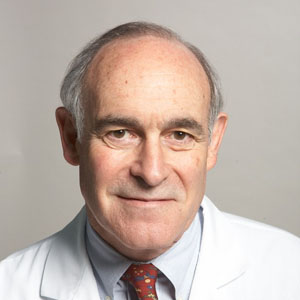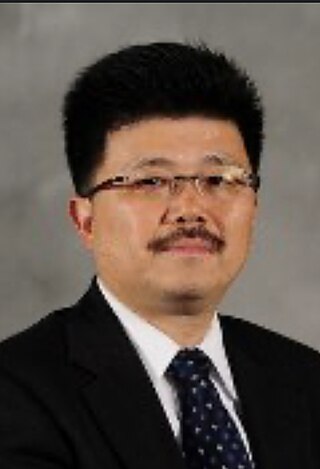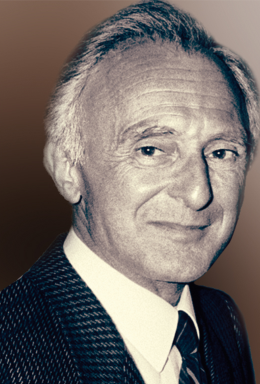Molecular epidemiology is a branch of epidemiology and medical science that focuses on the contribution of potential genetic and environmental risk factors, identified at the molecular level, to the etiology, distribution and prevention of disease within families and across populations. This field has emerged from the integration of molecular biology into traditional epidemiological research. Molecular epidemiology improves our understanding of the pathogenesis of disease by identifying specific pathways, molecules and genes that influence the risk of developing disease. More broadly, it seeks to establish understanding of how the interactions between genetic traits and environmental exposures result in disease.
The Joseph L. Mailman School of Public Health is the public health graduate school of Columbia University. Located on the Columbia University Irving Medical Center campus in the Washington Heights neighborhood of Manhattan, New York City, the school is accredited by the Council on Education for Public Health.

Joseph F. Fraumeni Jr. is an American physician and cancer researcher. Born in Boston, he received an A.B. from Harvard College, an M.D. from Duke University, and an M.Sc. in epidemiology from the Harvard School of Public Health. He completed his medical residency at Johns Hopkins Hospital and Memorial Sloan Kettering Cancer Center. He then joined the National Cancer Institute at the National Institutes of Health in 1962 as a commissioned officer of the U.S. Public Health Service, becoming the founding Director of the Division of Cancer Epidemiology and Genetics in 1995. He stepped down from this position in 2012 to become a senior investigator and advisor to the National Cancer Institute.

Peter Boyle, FRSE FFPH FRCPS(Glas) FRCP(Edin) FMedSci, was a British epidemiologist. He conducted research on globalisation of cancer, where he showed the dramatic increase of cancer in low- and medium income countries.
Philippe Autier is a Belgian epidemiologist. He is doing research on cancer, where he contributed to the understanding of the role of UV exposure in cancer development.
Carlo La Vecchia is an Italian epidemiologist. He is doing research on chronic diseases, where he contributed to the understanding of the risks related to diet, tobacco, oral contraceptive use and occupational or environmental exposure to toxic substances in cancer and other chronic diseases development.
Derek LeRoith is a South African endocrinologist and Professor of Medicine and the current Chief of the Hilda and J. Lester Gabrilove, M.D. Division of Endocrinology, Diabetes and Bone Disease and Director of the Metabolism Institute of the Mount Sinai Medical Center in New York City. He is an international expert in insulin-like growth factor-1 (IGF-1).
David A. Savitz is a professor of Community Health in the Epidemiology Section of the Program in Public Health, Vice President for Research, and Professor of Obstetrics and Gynecology, at The Alpert Medical School of Brown University, and Associate Director for Perinatal Research in The Department of Obstetrics and Gynecology at Women & Infants Hospital, both in Providence, Rhode Island. Savitz is the author of Interpreting epidemiologic evidence: strategies for study design and analysis (ISBN 0-19-510840-X) and more than 275 peer-reviewed articles. He was elected to the Institute of Medicine in 2007.

Robert J. Desnick is an American human geneticist whose basic and translational research accomplishments include significant discoveries in genomics, pharmacogenetics, gene therapy, personalized medicine, and the treatment of genetic diseases. His translational research has led to the development of the enzyme replacement therapy (ERT) and the chaperone therapy for Fabry disease, ERT for Niemann–Pick disease type B, and the RNA Interference Therapy for the Acute Hepatic Porphyrias.
William K. Oh, is an American medical oncologist, academic and industry leader and expert in the management of genitourinary malignancies, including prostate, renal, bladder and testicular cancers.

Ming-Ming Zhou is an American scientist whose specification is structural and chemical biology, NMR spectroscopy, and drug design. He is the Dr. Harold and Golden Lamport Professor and Chairman of the Department of Pharmacological Sciences. He is also the co-director of the Drug Discovery Institute at the Icahn School of Medicine at Mount Sinai and Mount Sinai Health System in New York City, as well as Professor of Sciences. Zhou is an elected fellow of the American Association for the Advancement of Science.
Clement Adebamowo is a Nigerian medical researcher and academic. Born in Lagos, Nigeria, Adebamowo is currently Director For Global Health Cancer Research, and a professor of Epidemiology & Public Health, at the University of Maryland School of Medicine. He is known for his work in cancer epidemiology, nutrition epidemiology, and research ethics, particularly in low resource and under-served in Africa.

Lorenzo (Renzo) Tomatis was an Italian physician and experimental oncologist who researched carcinogenesis and its primary prevention

Leona D. Samson is the Uncas and Helen Whitaker Professor and American Cancer Society Research Professor of Biological Engineering at the Massachusetts Institute of Technology, where she served as the Director of the Center for Environmental Health Sciences from 2001 to 2012. Before her professorship at MIT, she held a professorship at the Harvard School of Public Health. She is on the editorial board of the journal DNA Repair. Her research interests focus on "methods for measuring DNA repair capacity (DRC) in human cells", research the National Institute of Health recognized as pioneering in her field, for which the NIH granted her the National Institutes of Health Director's Pioneer Award.
Paolo Vineis is an Italian professor of Environmental Epidemiology at Imperial College London.

Curtis. C. Harris is the head of the Molecular Genetics and Carcinogenesis Section and chief of the Laboratory of Human Carcinogenesis at the Center for Cancer Research of the National Cancer Institute, NIH.
Cornelia "Neli" Ulrich is executive director of the Comprehensive Cancer Center at Huntsman Cancer Institute (HCI), Jon M. and Karen Huntsman Presidential Professor in Cancer Research, and former Division Chief of Cancer Population Sciences in the Department of Population Health Sciences at the University of Utah. Ulrich oversees HCI's academic consortium of nearly 200 cancer research teams. She leads efforts to advance the impact of HCI's research in laboratory, clinical and population science, with the goal of improving cancer prevention and treatment. Prior to joining HCI, she was the director and department head of preventive oncology at the National Center of Tumor Diseases (NCT) and German Cancer Research Center (DKFZ) in Heidelberg. During this time, she also held a Professorship at the DKFZ and University of Heidelberg. From 1993 until 2009, Ulrich was a Member of the Fred Hutchinson Cancer Research Center and Professor in Epidemiology at the University of Washington in Seattle.
Dafna Bar-Sagi is a cell biologist and cancer researcher at New York University School of Medicine. She is the Saul J. Farber Professor in the department of biochemistry and molecular pharmacology and the department of medicine and senior vice president and vice dean for science at NYU Langone Health. Bar-Sagi has been a member of scientific advisory boards, including the National Cancer Institute, Starr Cancer Consortium, and Pancreatic Cancer Action Network.

Elisabete Weiderpass-Vainio is a Brazilian cancer researcher who is Director of the International Agency for Research on Cancer, a part of the World Health Organization. Her research considers the epidemiology and prevention of cancer.
Folakemi Titilayo Odedina is a Nigerian-born scientist and professor of pharmacy and medicine at the University of Florida. She is the principal investigator for the Prostate Cancer Transatlantic Consortium (CaPTC), a clinical research group using genomic science and environmental etiology to exploring disproportionate burden of prostate cancer among Black men funded by the NCI. She is a member of American Cancer Society's National Prostate Cancer Disparities Advisory Team.







